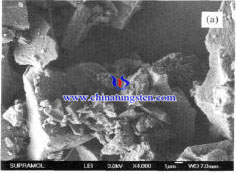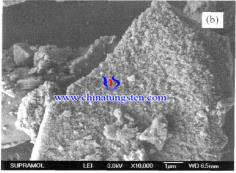Silicon Dioxide Supported Ammonium Metatungstate Catalyst
- Details
- Category: Ammonium Metatungstate
- Published on Saturday, 08 October 2016 14:55
- Written by chunyan
- Hits: 2059
It is found that the supported ammonium metatungstate (AMT) catalysts with the carriers of silicon dioxide, titanium dioxide and aluminium oxide have exhibited good catalytic activity for the synthesis of ortho - light anisole by gas - phase reaction of catechol and methanol. Among them, the AMT / silicon dioxide catalyst with tungsten loading of 7.9% has the best catalytic performance; in addition, the species with weak acidity and alkalinity which formed by the partial decomposition of ammonium metatungstate in the calcination process has been indicated to be the active center of the catalytic reaction.




Preparation of silicon dioxide supported ammonium metatungstate catalyst is using the traditional impregnation method, which is dipping carrier of silicon dioxide with ammonium metatungstate (AMT) aqueous solution in equal volume, followed by drying at 363 K for 6 hours, and then calcining at a certain temperature for 3 hours under air atmosphere to obtain SiO2/AMT catalyst. The study found that the calcination temperature affects the catalytic activity of silicon dioxide supported ammonium metatungstate catalyst; while the catalysts obtained at calcination temperatures of 533K and 573K showed the highest catechol conversion rate and selectivity of adjacent hydroxyl benzene methyl ether within 10 hours, which is respectively maintaining at about 97% and 90%.
Moreover, with the extension of reaction time, the activity of silicon dioxide supported ammonium metatungstate catalyst is decreased slowly, which is mainly attributed to the carbon deposition on the catalyst. The study of regeneration of deactivated SiO2 / AMT catalyst has proved that both the alcohol washed purging and low temperature (533k) calcination could not obviously restore the activity of the catalyst, and also the regenerated catalyst has stability no better than the fresh catalyst. This may be due to the change of the properties (including the acidity and alkalinity) of active centers on catalyst surface after high temperature regeneration treatment, and to make the easier deactivation of regenerated catalyst.
| AMT Supplier: Chinatungsten Online ammonium-metatungstate.com | Tel.: 86 592 5129696; Fax: 86 592 5129797;Email:sales@chinatungsten.com |
| Tungsten News&Tungsten Prices, 3G Version: http://3g.chinatungsten.com | Molybdenum News & Molybdenum Price: http://news.molybdenum.com.cn |





 sales@chinatungsten.com
sales@chinatungsten.com